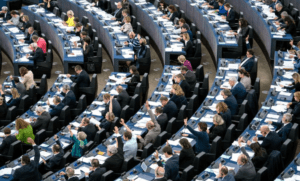Less than half of the MEPs that arrived in July 2014 were new to the Parliament. Some 51.5% had served as MEPs previously. Greece had the largest proportion of new MEPs at 90.5%.
The share of women MEPs was 36.9% at the start of the term, decreasing slightly to 36.5% at end of March 2019. The average age of MEPs at the end of March 2019 was 55. At the constituent session in July 2014 the average was 53. Between July 2014 and March 2019, 108 MEPs left: 43 resigned, six died and 59 started a new job.
Longer plenaries
Plenary sessions are the pinnacle of MEPs’ work, when they vote on legislation and debate topical issues. During the 2009-2014 term there were 260 days of plenary amounting to 2,160 hours. From July 2014 to December 2018, MEPs had already attended 255 days of plenary totalling 2,187 hours of sittings.
They held more than 27,000 votes by the end of 2018, up from 23,553 in the previous term.
How long it takes to pass legislation
Legislation is proposed by the European Commission and has to be approved by the European Parliament and the Council of the EU before becoming law. MEPs negotiate with EU governments to reach an agreement on the final text of the legislation. Depending on how hard the negotiations are, there could be up to three readings in both Parliament and Council.
Most legislative acts in this term were adopted at first reading, taking an average of 18 months. If a legislative act had to go to a second reading, the average length of the procedure increased to 39-40 months.
Political parties at national and European level
National political parties compete in the European elections, but once the elected MEPs arrive in Parliament, they form multi-national parliamentary groups. The number of parliamentary groups has remained quite stable over the years: between 2004 and 2014 there were seven groups in Parliament. The number rose to eight during this term.
However, the number of representatives from national political parties has been steadily growing. In the 2004-2009 term there were MEPs from 168 national parties, at the start of the current term that number had risen to 191 and by end of March 2019 there were members from 232 national parties.
-
2,134 texts adopted in plenary, including 708 legislative acts
-
552 public hearings held by parliamentary committees
-
6,880 petitions received
-
Nearly 1.6 million people visited Parliament’s plenary chambers







Leave a Reply